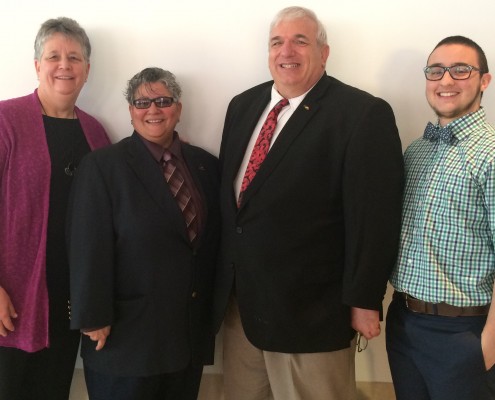HRC Panel Discussion Provokes Thoughts on State of Catholic Church
 By Kate Stoltzfus
By Kate Stoltzfus
Pope Francis was on the docket Tuesday morning at the Human Rights Campaign in Washington, D.C. “The State of LGBT Catholics in the Age of Pope Francis” was the first in what will be a series of panel discussions on issues in the Catholic faith.
Theologian Mary E. Hunt of WATER (Women’s Alliance for Theology, Ethics, and Ritual), Francis DeBernardo, executive director of New Ways Ministry, and Jes N. Stevens, a queer Catholic activist from Catholics in Alliance for the Common Good, shared thoughts on the papacy of Pope Francis and the state of the church, with special attention to LGBTIQ issues. The panel was moderated by Lisbeth M. Melendez Rivera, director of Latina/o and Catholic Initiatives at HRC.
Hunt opened the discussion with structural issues of the church, how it relates to LGBTIQ people, and its continued exclusion of women from church leadership and decision-making.
“What is at stake in Catholicism today is not the person or the pope, but the meaning of the papacy,” Hunt said. “As we have seen with the retirement of Benedict XVI, popes come and go, but the papacy remains as a symbol and a structure of power. I believe that that is a mistake—that the papacy ought to be a symbol of unity not authority, that shared decision-making on doctrine and polity, on property and morality is what the Roman Catholic Church needs even more than it needs a likeable pope.”
Both DeBernardo and Stevens highlighted the ways in which they believe Pope Francis is paving the way for a more inclusive church. Though there have not been official policy decisions changing the church’s treatment of LGBTQ people, Francis’ attitude marks a shift toward progressive thinking.
“Today’s panel with HRC is just the kind of discussions we should be engaging in, and it was wonderful to see a diverse audience,” said Stevens. “I believe it was evident from the audience participation and the feedback received following the event that LGBT Catholics want change, and they are hopeful about being a part of that change.”
Hunt agreed that there was a level of progress in certain areas, but hastened to point out that “we should not let low expectations set the bar such that crumbs from the table are somehow acceptable,” she said. “Nothing less than the acknowledgement of our full humanity as LGTBIQ people on our terms is adequate.”
All future HRC events in the series will be free and open to the public.

